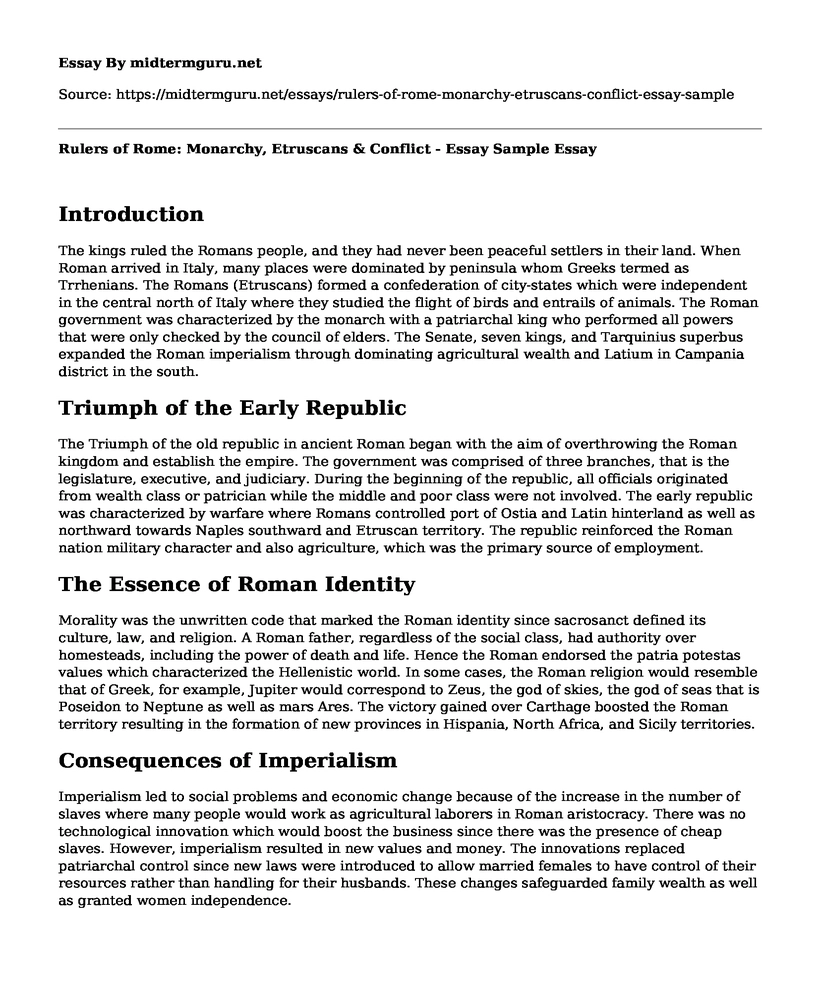Introduction
The kings ruled the Romans people, and they had never been peaceful settlers in their land. When Roman arrived in Italy, many places were dominated by peninsula whom Greeks termed as Trrhenians. The Romans (Etruscans) formed a confederation of city-states which were independent in the central north of Italy where they studied the flight of birds and entrails of animals. The Roman government was characterized by the monarch with a patriarchal king who performed all powers that were only checked by the council of elders. The Senate, seven kings, and Tarquinius superbus expanded the Roman imperialism through dominating agricultural wealth and Latium in Campania district in the south.
Triumph of the Early Republic
The Triumph of the old republic in ancient Roman began with the aim of overthrowing the Roman kingdom and establish the empire. The government was comprised of three branches, that is the legislature, executive, and judiciary. During the beginning of the republic, all officials originated from wealth class or patrician while the middle and poor class were not involved. The early republic was characterized by warfare where Romans controlled port of Ostia and Latin hinterland as well as northward towards Naples southward and Etruscan territory. The republic reinforced the Roman nation military character and also agriculture, which was the primary source of employment.
The Essence of Roman Identity
Morality was the unwritten code that marked the Roman identity since sacrosanct defined its culture, law, and religion. A Roman father, regardless of the social class, had authority over homesteads, including the power of death and life. Hence the Roman endorsed the patria potestas values which characterized the Hellenistic world. In some cases, the Roman religion would resemble that of Greek, for example, Jupiter would correspond to Zeus, the god of skies, the god of seas that is Poseidon to Neptune as well as mars Ares. The victory gained over Carthage boosted the Roman territory resulting in the formation of new provinces in Hispania, North Africa, and Sicily territories.
Consequences of Imperialism
Imperialism led to social problems and economic change because of the increase in the number of slaves where many people would work as agricultural laborers in Roman aristocracy. There was no technological innovation which would boost the business since there was the presence of cheap slaves. However, imperialism resulted in new values and money. The innovations replaced patriarchal control since new laws were introduced to allow married females to have control of their resources rather than handling for their husbands. These changes safeguarded family wealth as well as granted women independence.
Restoring the Republic, the Struggle for Power
The end of the Punic war marked the restoration of the republic in Rome. Tiberius Gracchus was appointed as a people's tribune to alleviate economic and social issues through implementing various reforms. For instance, Gracchus limited the number of lands that a person could own to ensure small farmers get theirs, which they lost to equestrians and patricians. However, Gracchi reforms were not successful in a situation which imposed challenges to the Senate. Thus the dictatorship of Sulla empowered the aristocracy and weakened the pleb's authority.
The Participate and the Pax Roman
Caesar adopted Gaius Octavius, a grandnephew who served the IIIyria in the Adriatic Sea. Octavian used his authority to form the alliance and make Marcus Aemilius Lepidus, a senator in a triumvirate. Both Octavian and Antony had never been compatible. The Octavian was finally termed as a traitor whereas Senate declared the conflict on Cleopatra where the Roman Superior conquered the Cleopatra and Antony in the Actium war, the coast of Greece and eventually, both Cleopatra and Antony committed suicide. The victory at Actium gave Rome the new beginning since the officials governed from Persia to Britain.
Making the World Roman
When the Roman peace broke, local elites were supposed to adopt the mode of dressing and behavior to reign its political nature. After the death of Augustus, the Roman authors became cultural critics where tales of Apuleius and Petronius described the sordid and bizarre aspects of the Romans nature. The aristocratic historian described the people and events to expose judgment to them. Roman architecture, engineering, and art assumed a role where people loved the paintings and mosaics walls made with tiny fragments of stone and glass. Also, Roman engineering and architecture become useful, particularly in the civilization of legacies.
Reference
Joshua Cole and Carol Symes (2014). Western civilization: Their History & Their Culture. Norton and New York Company in London volume 1: 9th edition.
Cite this page
Rulers of Rome: Monarchy, Etruscans & Conflict - Essay Sample. (2023, Jan 20). Retrieved from https://midtermguru.com/essays/rulers-of-rome-monarchy-etruscans-conflict-essay-sample
If you are the original author of this essay and no longer wish to have it published on the midtermguru.com website, please click below to request its removal:
- Defining Terrorism - Essay Sample
- Essay on the Versailles Settlement
- Paper Example on Protest Movements
- Research Paper on Background and Identity of Saint Padre Pio
- Conspiracy Analysis on 9/11 Being an Inside Job
- Movie Analysis Essay on Pearl Harbor
- Orpheus & Eurydice: Love, Interest & Obsession - Essay Sample







